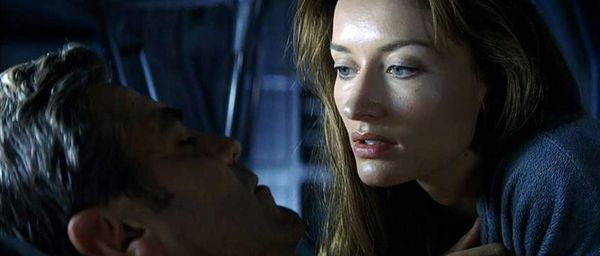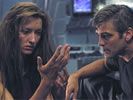Eye For Film >> Movies >> Solaris (2002) Film Review
Solaris
Reviewed by: Angus Wolfe Murray

Returning to the tradition of 2001: A Space Odyssey, Steven Soderbergh does not explain the planet Solaris, which lies hidden beneath pink veined clouds. The pace of the film is slow enough to let tension tighten in its natural time. Quietly, questions of existence are posed. "There are no answers," the cloned replicant of a suicide says. "Only choices."
On the space station that orbits Solaris, paranoia has evolved into a degree of mistrust, bordering on terror. Only Dr Gordon (Viola Davis) and Snow (Jeremy Davies) are left alive. When the psychiatrist Chris Kelvin (George Clooney) arrives from Earth to sort things out, Gordon has locked herself in her cabin and Snow plays intergalactic mind games on the console, while gibbering to himself.

"What happened here?" Kelvin asks.
Snow twists nervously in his chair.
"Until it starts happening to you, there's no point in discussing it."
It doesn't take long. Kelvin sleeps and dreams of meeting Rheya (Natascha McElhone) again and then awakes to find her lying beside him. Rheya has been dead for three years. How did she get here? Who is this person who talks and looks like Rheya?
"I don't actually remember anything," she says. "I only remember you."
Gordon calls them "visitors". They are part of Solaris; they come from there. "We are in a situation that is beyond morality," she says. There is a way of destroying them. Gordon urges Kelvin to kill the thing that is Rheya. "She is seducing you again," she warns. Kelvin waits.
Writer/director Soderbergh is in complete control of a story that breathes in different air. His use of real time, old time, dream and memory is orchestrated with such delicacy that the meaning of truth dissolves into pure sensation. Reality becomes a concept, invented for some other purpose, belonging to some other place. Who you are is how you feel. The mystery of Solaris contains the secret of alien colonisation and the arrogance of man's supremacy.
Cliff Martinez's musical score perfectly reflects a spatial experience and the effects, few as they are, of the mothership are beautifully constructed. This is not an actor's film. Clooney's presence is felt and McElhone's cheekbones deserve praise. Only Davies dives into the box of tricks and comes up with mannerisms resembling a person you might have met at a stoned student party. His performance stands out a mile and there isn't enough of him.
Andrei Tarkovsky's version of Stanislaw Lem's novel, made in 1972, is ponderous and tiring by comparison. Soderbergh, like Kubrick before him, may not touch the planet's skin, but understands the workings of its spirit.
Reviewed on: 26 Feb 2003




















